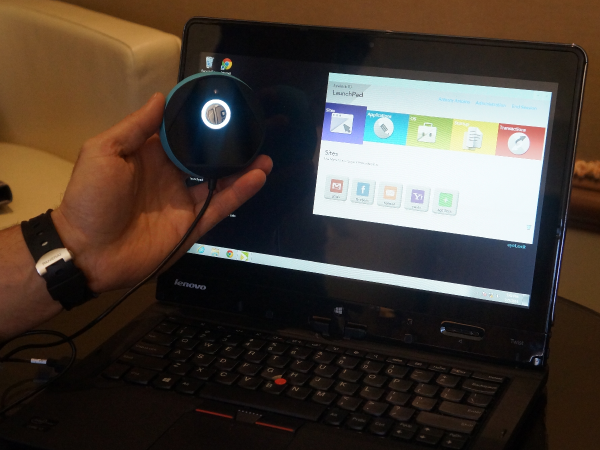EyeLock Myris Secures Computer With Eye Scan in Place of Password
Tech Media Network
By Tom's Guide / Marshall Honorof January 7, 2014

If you have used a computer at some point in your life, chances are good that you've recorded some sensitive information on it. The Myris, a USB gadget from EyeLock, aims to put your information behind one of the safest keys available: the human eye.
The Myris, which made its commercial debut at CES 2014, is a small hemispherical object that plugs into any computer via USB and scans a user's iris to unlock the machine. (EyeLock has not specified a price or release date for the Myris.) Unlike the more familiar retinal scan, this process identifies more than 240 unique points in a user's iris, the colored part of the eyeball that surrounds the black pupil.
Myris uses its onboard video camera to scan a person's iris, including its surface pattern as well as depth into the eye itself, though Eyelock declined to elaborate on this point in order to protect its methods.
Using a custom algorithm, the Myris then converts that image into a sequence of 2048 ones and zeroes. That sequence, called a key, becomes your unique Myris ID. That ID is then encrypted using an AES-256 encryption algorithm, scrambled again, and stored on the Myris device.
Then, on the Myris app, you input your passwords to any online services such as Gmail, Facebook, Paypal and more. The Myris app (which works on Windows 7 and 8, Chrome OS and Mac OS X) associates your Myris key with that password, storing all information locally to the device itself to minimize security risks.
The next time you need to access that account, plug the Myris into your computer via a USB port, sign into the Myris app by scanning your eye, and then select the account from the Myris app dashboard.
We checked out the Myris at CES 2014 in Las Vegas, where the device was able to scan our eyes even through glasses and build a profile in just a few seconds.
EyeLock asserts that, in terms of security, iris scanning is second only to DNA analysis. Since no two humans on the planet have exactly the same iris pattern, including twins, EyeLock cites the false positive rate at 1 in 2.25 trillion (Earth's population is approximately 7 billion).
Although savvy hackers may yet discover ways to thwart the Myris, when used as intended, it could provide a formidable extra layer of security for machines carrying sensitive information (pretty much any computer). EyeLock even asserts that the device will obviate the need to secure a computer with a username and password.
Release date and pricing for the Myris have yet to be determined, but keep your eyes open (and about 15 inches away) for more news to surface about it later in 2014.
